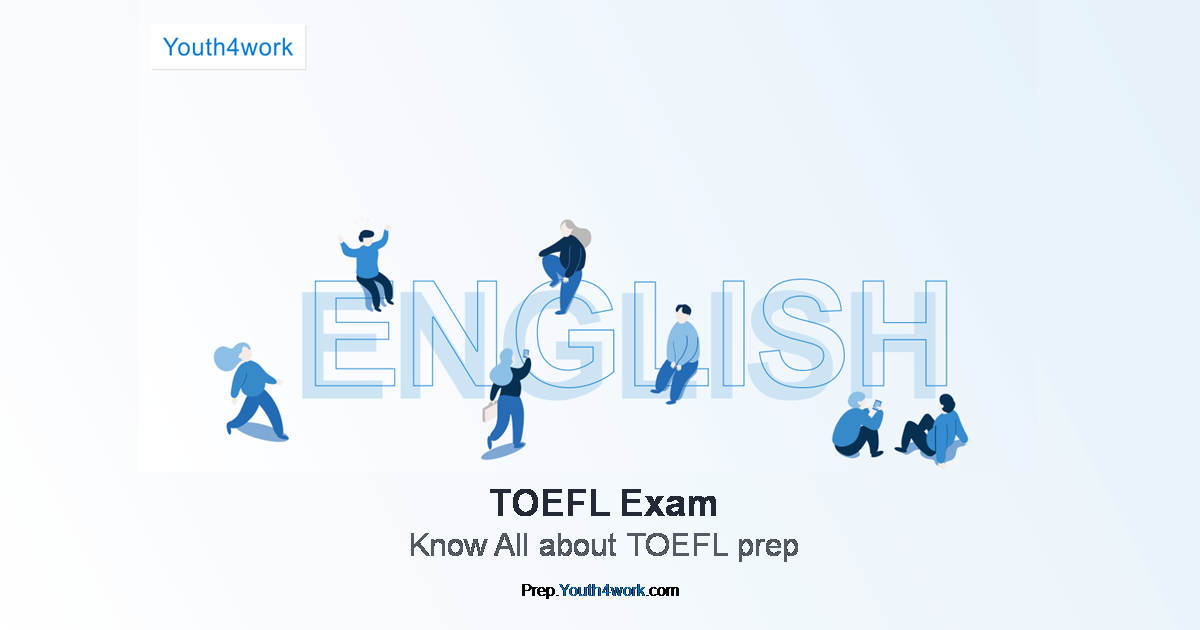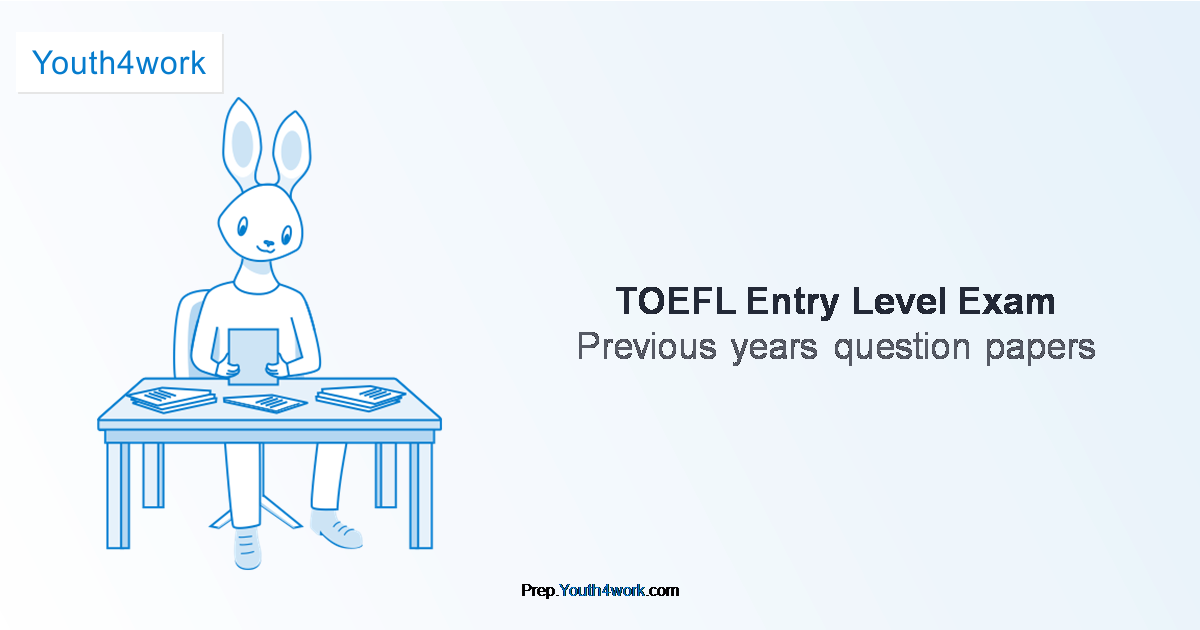TOEFL Test Exam Pattern, Insights & Details
TOEFL (Test Of English Language as a foreign language) is the special test develop to evaluate the ability of a non-native speaker to use and understand English in an academic setting. This test is divided into four sections listening, reading, speaking and writing skills to perform academic tasks. This test is a computer-based test. The exam is conducted almost every year & 35 to 40 times in a year. The exam is conducted to check the speaking skills of individuals. The candidate who going to apply for a TOEFL exam should complete their four-year graduate degree from recognized university or equivalent to that of the USA. A three-year degree exam is not sufficient for this exam. The duration of the exam is four and a half-hour. There is no negative marking in the exam.
Eligibility Criteria | Syllabus | Exam Pattern | Tips and Tricks | Take Free Mock Test
Key Highlight
of TOEFL

Eligibility:
Candidate should complete a four-year bachelor's degree from a recognized University.

Application fees:
$180 in India

Type of Exam:
Computer-based exam

Exam Duration:
270 minutes

Paper Description:
1. Reading
2. Listening
3. Speaking
4. Writing
TOEFL Test Exam Pattern
Type: Computer-based test (CBT).
Duration: The duration of the paper TOEFL exam will be of 270 minutes.
Sections in the Paper:
- Reading: 12-16 questions from 3-4 passages each
- Listening: 4-6 lectures with 6 questions from each lecture
- 2-3 conversations with 5 questions from each conversation
- Speaking: 6 tasks
- Writing: 1 integrated and 1 independent task
Syllabus Covered: Syllabus of TOEFL Test Listening, Reading, Speaking & Writing.
The reading section will cover 3 or 4 passages from the academic test.
Listening section will cover questions from Listening lectures, classroom conversations, & discussions.
The speaking section will cover topics from familiar topics, speak based on reading & Listening. The writing section will cover Topics from Essay writing & based on reading & Listening tasks.
Marking Scheme: Different marking schemes for each section and there is no negative marking.
Understanding the competition in TOEFL Test
Understanding the competition is an important step before appearing for any competitive exam, so it is for TOEFL. The TOEFL (Test of English language as a foreign language) is the special test develop to evaluates the ability of a non-native speaker to use and understand English. The candidates need to outperform others to secure a spot in the shortlist for the written test, GD (Group Discussion) and finally PI (Personal Interview) process.
TOEFL is a test of communication and the ability to take the organization's pressure. In any business organization, the manager has to undergo stress and face market reality to maintain the positioning of the company's brand. Hence, in this context, TOEFL aspirants are being tested not only for their communication skills and language skills but the added pressure of Listening & writing skills. TOEFL exam helps the aspirants who want to work in the Business Environment.
Minimum marks required for Admission in TOEFL
Here is a list of some universities and the TOEFL score they want you to have to enter it or to validate specific diplomas. The minimum TOEFL score requires getting admission in US universities. Montana State University - minimum 550 marks, Morgan State University minimum 500 marks are required to get admission.
TOEFL iBT test Sections
Reading Topics and syllabus
The Reading section consists of questions on 3-5 passages, each approximately 700 words in length. The passages are on academic topics; they are the kind of material that might be found in an undergraduate university textbook. Passages require an understanding of rhetorical functions such as cause-effect, compare-contrast, and argumentation. Students answer questions about main ideas, details, inferences, essential information, sentence insertion, vocabulary, rhetorical purpose, and overall ideas. New types of questions in the TOEFL iBT test require filling out tables or completing summaries. Prior knowledge of the subject under discussion is not necessary to come to the correct answer.
Listening Topics and syllabus
The Listening section consists of questions on six passages, each 3–5 minutes in length. These passages include two student conversations and four academic lectures or discussions. The conversations involve a student and either a professor or a campus service provider. The lectures are a self-contained portion of an academic lecture, which may involve student participation and does not assume specialized background knowledge in the subject area. Each conversation and lecture passage is heard only once. Test-takers may take notes while they listen and they may refer to their notes when they answer the questions. Each conversation is associated with five questions and each lecture with six. The questions are meant to measure the ability to understand main ideas, important details, implications, relationships between ideas, organization of information, speaker purpose and speaker attitude.
Speaking Topics and syllabus
The Speaking section consists of six tasks: two independent and four integrated. In the two independent tasks, test-takers answer opinion questions on familiar topics. They are evaluated on their ability to speak spontaneously and convey their ideas clearly and coherently. In two of the integrated tasks, test-takers read a short passage, listen to an academic course lecture or a conversation about campus life and answer a question by combining appropriate information from the text and the talk. In the two remaining integrated tasks, test-takers listen to an academic course lecture or a conversation about campus life and then respond to a question about what they heard. In the integrated tasks, test-takers are evaluated on their ability to appropriately synthesize and effectively convey information from the reading and listening material. Test-takers may take notes as they read and listen and may use their notes to help prepare their responses. Test-takers are given a short preparation time before they have to begin speaking. The responses are digitally recorded, sent to ETS’s Online Scoring Network (OSN), and evaluated by three to six raters.
Writing Topics and syllabus
The Writing section measures a test taker's ability to write in an academic setting and consists of two tasks: one integrated and one independent. In the integrated task, test-takers read a passage on an academic topic and then listen to a speaker discuss it. The test-taker then writes a summary of the important points in the listening passage and explains how these relate to the key points of the reading passage. In the independent task, the test-taker must write an essay that states their opinion or choice, and then explain it, rather than simply listing personal preferences or choices. Responses are sent to the ETS OSN and evaluated by at least 3 different raters.
Tips for Success on Test Day
- Dress comfortably for any room temperature.
- Eat a good breakfast.
- Arrive at the test center at least 30 minutes early.
- Follow directions carefully to avoid wasting time.
- Do not panic. Concentrate on the task in front of you. Do not think about the questions you have already answered.
- Do not spend too much time on one question.
- Do not leave questions blank. If you are not sure of the answer, make the best possible choice.
- Pace yourself to answer every question and avoid rushing at the end.
Youth4work Prep Tests
Online practice tests for competitive exams – are very unique and popular among aspirants. Aspirants can take self-designed mock-tests as well as practice for sections and topics separately. Youth4work’s unique and proprietary technology is helping lakhs of aspirants to reveal personal details on what are the strength areas of aspirants for any exam and also suggest how they can improve the performance.
Downloads
Case Study, Notes, Previous Year Paper
Discussion Q & A's of
Youths with similar talents will answer your query.








